Nissan Leaf VS Toyota Corolla Cross – Specs, Efficiency & Price Comparison
Which model is the better choice – the Nissan Leaf or the Toyota Corolla Cross? We compare performance (217 HP vs 197 HP), boot capacity (394 L vs 425 L), efficiency (16.70 kWh vs 5.10 L), and of course, the price (30800 £ vs 31300 £).
Find out now which car fits your needs better!
The Nissan Leaf (Hatchback) is powered by a Electric engine and comes with a Automatic transmission. In comparison, the Toyota Corolla Cross (SUV) features a Full Hybrid engine and a Automatic gearbox.
When it comes to boot capacity, the Nissan Leaf offers 394 L, while the Toyota Corolla Cross provides 425 L – depending on what matters most to you. If you’re looking for more power, you’ll need to decide whether the 217 HP of the Nissan Leaf or the 197 HP of the Toyota Corolla Cross suits your needs better.
There are also differences in efficiency: 16.70 kWh vs 5.10 L. In terms of price, the Nissan Leaf starts at 30800 £, while the Toyota Corolla Cross is available from 31300 £.
Compare all the key specs now and find out which model fits your lifestyle best!
Nissan Leaf
The Nissan Leaf stands out as a pioneering model in the realm of electric vehicles, known for its impressive blend of practicality and eco-friendliness. It offers a smooth and quiet driving experience, making it an ideal choice for city commuting and longer journeys alike. The interior design is both comfortable and intuitive, providing drivers with a sense of modernity and ease of use.
details @ germany.nissannews.com
@ germany.nissannews.com
 @ germany.nissannews.com
@ germany.nissannews.com
 @ germany.nissannews.com
@ germany.nissannews.com
 @ germany.nissannews.com
@ germany.nissannews.com
Toyota Corolla Cross
The Toyota Corolla Cross is a stylish and versatile SUV that seamlessly blends the reliability of the Corolla lineage with the practicality of a modern crossover. Its spacious interior and elevated driving position provide a comfortable and commanding experience, making it an attractive choice for families and adventurers alike. With a focus on efficiency and performance, the Corolla Cross promises a smooth ride while maintaining the brand's commitment to quality and durability.
details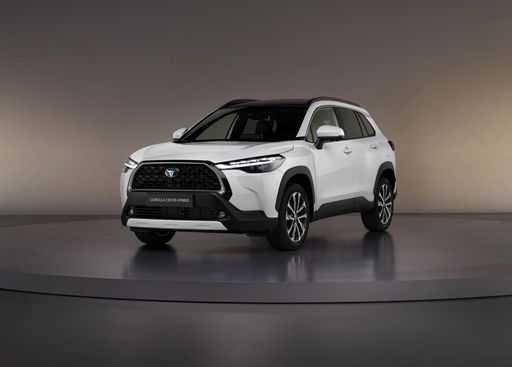 @ Toyota
@ Toyota
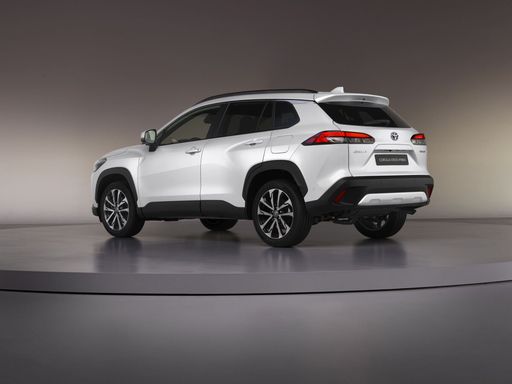 @ Toyota
@ Toyota
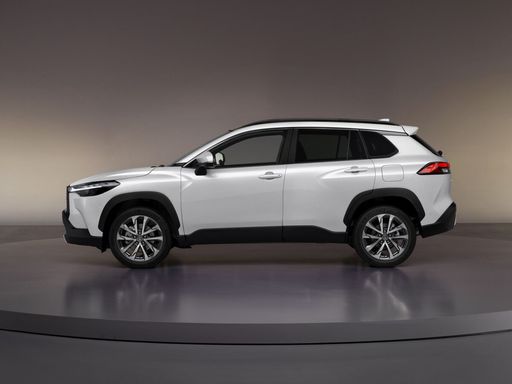 @ Toyota
@ Toyota
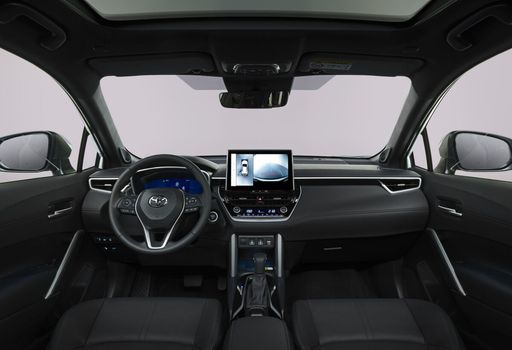 @ Toyota
@ Toyota
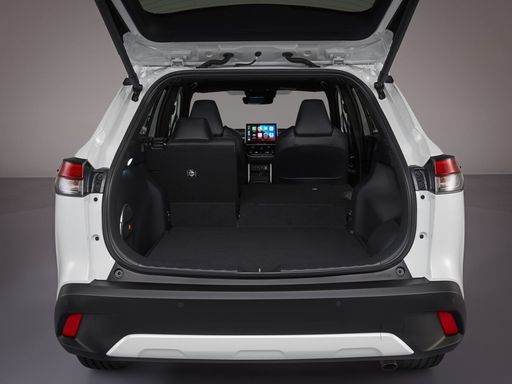 @ Toyota
@ Toyota

|

|
|
|
|
Costs and Consumption |
|
|---|---|
|
Price
30800 - 37200 £
|
Price
31300 - 41100 £
|
|
Consumption L/100km
-
|
Consumption L/100km
5.1 - 5.3 L
|
|
Consumption kWh/100km
16.7 - 17.8 kWh
|
Consumption kWh/100km
-
|
|
Electric Range
270 - 385 km
|
Electric Range
-
|
|
Battery Capacity
39 - 59 kWh
|
Battery Capacity
-
|
|
co2
0 g/km
|
co2
114 - 121 g/km
|
|
Fuel tank capacity
-
|
Fuel tank capacity
43 L
|
Dimensions and Body |
|
|---|---|
|
Body Type
Hatchback
|
Body Type
SUV
|
|
Seats
5
|
Seats
5
|
|
Doors
5
|
Doors
5
|
|
Curb weight
1580 - 1756 kg
|
Curb weight
1450 - 1575 kg
|
|
Trunk capacity
385 - 394 L
|
Trunk capacity
414 - 425 L
|
|
Length
4490 mm
|
Length
4460 mm
|
|
Width
1788 mm
|
Width
1825 mm
|
|
Height
1540 - 1545 mm
|
Height
1620 mm
|
|
Payload
384 - 415 kg
|
Payload
440 - 490 kg
|
Engine and Performance |
|
|---|---|
|
Engine Type
Electric
|
Engine Type
Full Hybrid
|
|
Transmission
Automatic
|
Transmission
Automatic
|
|
Transmission Detail
Reduction Gearbox
|
Transmission Detail
-
|
|
Drive Type
Front-Wheel Drive
|
Drive Type
Front-Wheel Drive, All-Wheel Drive
|
|
Power HP
150 - 217 HP
|
Power HP
140 - 197 HP
|
|
Acceleration 0-100km/h
6.9 - 7.9 s
|
Acceleration 0-100km/h
7.6 - 9.4 s
|
|
Max Speed
144 - 157 km/h
|
Max Speed
180 km/h
|
|
Torque
320 - 340 Nm
|
Torque
-
|
|
Number of Cylinders
-
|
Number of Cylinders
4
|
|
Power kW
110 - 160 kW
|
Power kW
103 - 145 kW
|
|
Engine capacity
-
|
Engine capacity
1798 - 1987 cm3
|
General |
|
|---|---|
|
Model Year
2019
|
Model Year
2024 - 2025
|
|
CO2 Efficiency Class
A
|
CO2 Efficiency Class
D, C
|
|
Brand
Nissan
|
Brand
Toyota
|
Nissan Leaf
Introduction to the Nissan Leaf: A Pioneer in Electric Mobility
The Nissan Leaf has established itself as a trailblazer in the realm of electric vehicles (EVs) since its launch. As we delve into its present-day iterations, the Leaf continues to soar in popularity due to remarkable advancements in technology and sustainability. Let's explore what makes the Nissan Leaf a standout in today's automotive market.
Power and Performance: Under the Hood of the Nissan Leaf
The Nissan Leaf boasts a power output ranging from 150 to 217 PS, depending on the battery option chosen. The vehicle's electric motor, a product of cutting-edge engineering, offers instant torque ranging from 320 to 340 Nm, resulting in impressive acceleration capabilities. The 0 to 100 km/h dash is achieved in as little as 6.9 seconds, showcasing its prowess in electric performance.
Battery Technology: Efficient Energy Management
When discussing the Nissan Leaf, battery technology is at the forefront. The available battery capacities range from 39 to 59 kWh, supporting an electric range between 270 to 385 km. This flexibility allows drivers to choose a model that best fits their driving habits, providing peace of mind for longer journeys without frequent recharging.
Sustainability: The Environmental Edge
One of the primary attractions of the Nissan Leaf is its commitment to sustainability. As an all-electric vehicle, it produces zero CO2 emissions, placing it in the top tier of the CO2-efficiency class with an 'A' rating. This clean energy approach contributes significantly to reducing environmental impact and supports Nissan's drive towards a greener future.
Design and Comfort: Aesthetic Appeal and Practicality
The Nissan Leaf is not just about efficiency; it's also designed for comfort and utility. With its sleek hatchback body and dimensions of 4490 mm in length, 1788 mm in width, and a height of up to 1545 mm, it offers ample interior space. The boot capacity ranges from 385 to 394 litres, providing sufficient storage for everyday needs. The model accommodates five passengers comfortably, ensuring a pleasant ride for everyone.
Innovations and Safety: Advanced Features for Peace of Mind
Nissan equips the Leaf with an array of intelligent features that enhance safety and convenience. The available equipment lines, including N-CONNECTA, Tekna, e+ N-CONNECTA, and e+ Tekna, offer varying levels of technology integration. ProPILOT Assist, e-Pedal, and a comprehensive suite of driver-assistance technology are just a few examples that highlight Nissan's commitment to innovation in the EV market.
Conclusion: The Nissan Leaf Continues to Lead
With prices ranging from €35,900 to €43,400, the Nissan Leaf remains an attractive choice for those looking to embrace electric mobility. It perfectly balances performance, design, and sustainability, making it a compelling choice in the competitive EV landscape. The Nissan Leaf not only represents the future of driving but also reinforces why it continues to be a leader in the electric vehicle community.
Toyota Corolla Cross
An Introduction to the Toyota Corolla Cross
The Toyota Corolla Cross is the latest addition to the popular Corolla family, adding a versatile SUV model to the line-up. With its sleek design and innovative hybrid technology, it marks a significant step forward in offering efficiency, comfort, and capability in a compact SUV package. Designed for those who appreciate both urban and rural exploration, the Corolla Cross promises an experience that balances performance with practicality.
Powertrain and Efficiency
The Corolla Cross features a full-hybrid powertrain, delivering a balance of power and efficiency that Toyota is well-known for. Available with either a 1.8-litre or 2.0-litre engine, the vehicle offers a range of power outputs between 140 to 197 PS. This versatility ensures that drivers can choose a model that fits their specific needs, whether it be more economical daily driving or greater power for extended journeys.
All models are equipped with a Continuously Variable Transmission (CVT), optimising power delivery and contributing to an impressive fuel economy. The consumption figures range from 5.1 to 5.3 L/100 km, making it an environmentally friendly option within the SUV market.
Driving Dynamics and Technology
The Corolla Cross offers a selection of drivetrain options, including both front-wheel drive and all-wheel drive, to cater to varying driving conditions and user preferences. The all-wheel-drive models are referred to as AWD-i, incorporating Toyota's intelligent system that adapts to the terrain, enhancing handling and safety.
Technological innovations include Toyota's Safety Sense suite, a comprehensive set of features that enhance driving safety. With integrated systems such as adaptive cruise control, lane departure alert, and pre-collision brake assist, drivers can enjoy a more confident driving experience.
Comfort and Interior Design
The Toyota Corolla Cross isn't just about performance and safety; it also excels in passenger comfort and interior design. Offering seating for five passengers, it combines spaciousness with elegant styling, ensuring that every journey is a pleasure. The boot provides a practical 414 to 425 litres of cargo space, sufficient for all personal or familial needs.
Passengers will appreciate the high-quality materials and thoughtful design found across the various trim levels, including the Business Edition, Comfort, Team Deutschland, and others. Each trim offers a unique combination of features tailored to meet differing customer preferences, from base-level practicality to high-end luxury appointments.
Pricing and Models
The pricing for the Toyota Corolla Cross is competitive, especially given the hybrid technology it boasts. Prices range from €36,190 to €47,090, placing it well within reach of buyers looking for a combination of efficiency, style, and modern conveniences. The running costs reflect Toyota's attention to economical design, with expenses estimated between €1009 to €1178 per month.
From Business Edition to the well-equipped Style AWD-i, customers can select a version that perfectly matches their requirements, ensuring there's something for everyone in the Corolla Cross range.
The Corolla Cross: A Conclusion
The Toyota Corolla Cross stands out in the compact SUV segment due to its stellar combination of a hybrid powertrain, advanced safety technologies, and versatile interior space. With its blend of style, functionality, and eco-conscious engineering, it is an ideal choice for those seeking a reliable and efficient vehicle that meets modern lifestyle demands. The Corolla Cross undoubtedly represents Toyota's continued commitment to innovation and quality in every vehicle they produce.
The prices and data displayed are estimates based on German list prices and may vary by country. This information is not legally binding.
